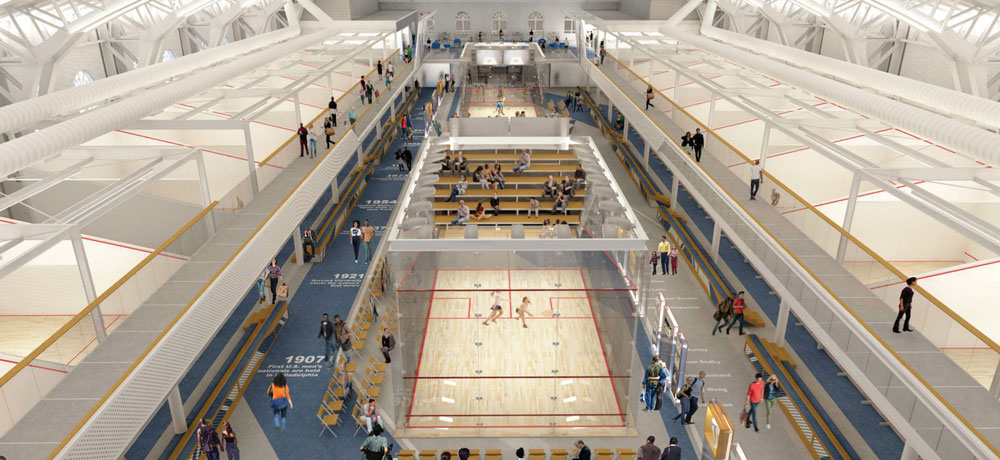
The university announced plans Sept. 14 to sublease the Drexel Armory on 32nd Street and Lancaster Avenue to U.S. Squash, the national governing body for the sport who will then transform the building into the largest squash center in America.
The three-story brick building — which currently houses ROTC and university events such as career fairs — will turn into the U.S. Squash National Center and will become the official home of the U.S. Squash Hall of Fame.
While Drexel will not be involved in the renovations, university president John A. Fry has encouraged the plans.
“Our vision… [is] to bring in a highly motivated partner, in U.S. Squash, that will turn the Armory into a national squash training center — a world-class facility that will be a treasure for the city, a boon to its economy and a place for Philadelphians to pick up a racket and play a lifetime sport that is one of the fastest-growing in the country,” Fry said in a DrexelNow announcement. Fry was chairman of the U.S. Squash board of directors 2013-16.
Construction of the squash center will begin next spring. The interior of the building, to be named after the longest-serving senator in Pennsylvania history and avid squash player, Arlen Specter, the Specter Squash Center will consist of 20 singles courts, two doubles courts and two glass-walled exhibition courts. This project will provide a major upgrade from Drexel’s Kline & Specter Squash Center — with seven total courts among the Recreation Center and the Daskalakis Athletic Center.
Building the large squash hub will also allow the U.S. Squash organization to host the U.S. Open — the most prestigious professional squash tournament in the U.S. — in a more spacious environment. In fact, with its opening slated for October 2020, the sport’s new capital center will be constructed in time for the U.S. Open Squash Championships.
“Our longstanding U.S. Open partnership with Drexel University has bolstered Philadelphia’s position as a central hub for the sport and has been critical to developing the event into one of the world’s most prominent squash championships,” said U.S. Squash president and CEO Kevin Klipstein. “With the Specter Center, the same spirit of collaboration will allow us to deliver world-class training for our elite athletes and model how to provide broad community access to squash for the rest of the country to follow.”
But while squash enthusiasts are bracing for this transformation, some Drexel students have different ideas for how the Armory could have been used.
“I think that there are better uses for the armory — something more that’s for the students,” Jeremiah Watson, a marketing and business analytics junior, said.
Watson, who was upset that students weren’t given a warning about the change, said that the campus lacks appropriate students services that are necessary — especially since the student population continues to grow.
“And they’re trying to attract more attention in ways that aren’t helping the community,” he added, which he said doesn’t fit with the university promise to be civically-minded.
He said he’d prefer if the space reflected these ideals and connected students to the community instead.
The space would be better suited for something that makes life more convenient to all students and not just some of its athletes, like a grocery store, George Fee, a video game design senior, said.
Having another spot on campus designated for squash is redundant, according to Fee.
“We already have a pretty well-known squash center,” Caitlyn Treacy, a sophomore studying psychology, said. “I don’t see how this will help the school.”
Treacy felt Drexel’s decision does not reflect what the students want.
“It seems that Drexel is more interested in their plans than the students’ plans,” she said. Indeed, other students wondered whether renovating the Armory at all should have been the school’s priority.
The administration should gear its energy towards improving the on-campus dorms, said communication senior Nicah Aguila.
“Didn’t Drexel just kick out dozens of upperclassmen [from housing] because there were too many freshmen enrolled?” Aguila asked. “I wish they’d prioritize on making Calhoun Hall livable again or investing in better dorms instead of making a squash center.”
Ramya Safish, a senior biology student, was concerned about the activities the Armory was formerly used for. A squash center is not a substitution for the student-oriented events the Armory formerly housed, such as the career fairs and voting, she said.
“The point of college is you have something when you walk away from it — and now they’re taking away the resources to do that,” she said.
Safish said that she is concerned about the amount of people the center will bring it and the effects the overcrowding could potentially yield on traffic, parking and campus safety more generally.
“There’s already too many people now,” she said. “How are they going to guarantee this isn’t going to be a problem?”
Updated 09/30/18 at 7 p.m.
Correction: A previous version of this article stated that Drexel University would be transforming the Drexel Armory and a quote from president John A. Fry was also misrepresented. Corrections have since been made. The Triangle regrets these errors.

